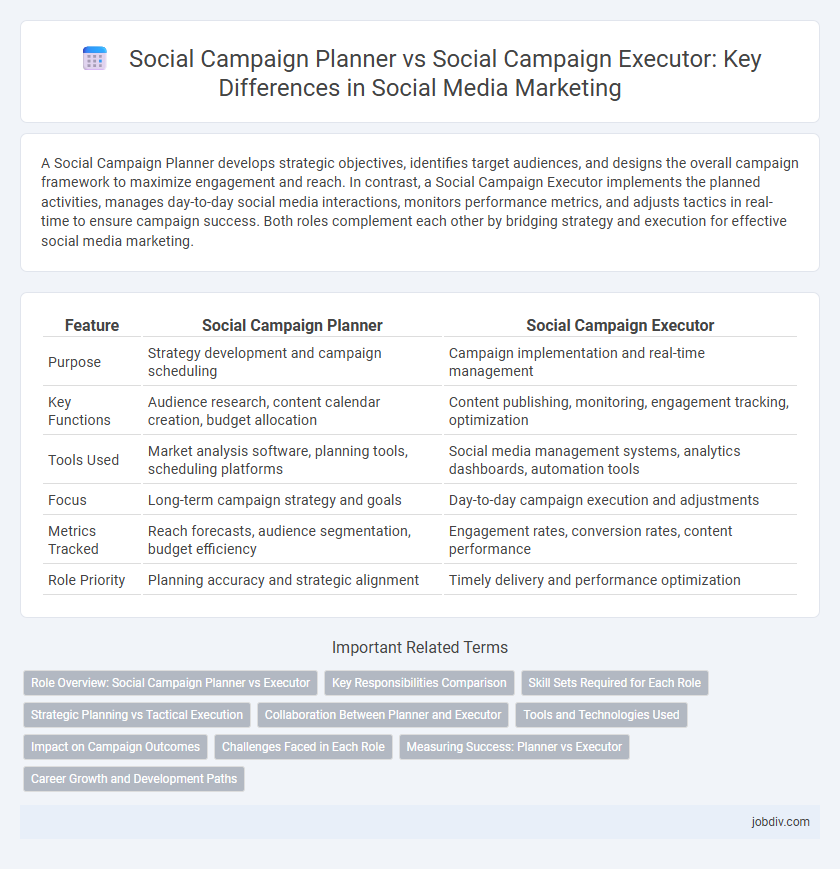A Social Campaign Planner develops strategic objectives, identifies target audiences, and designs the overall campaign framework to maximize engagement and reach. In contrast, a Social Campaign Executor implements the planned activities, manages day-to-day social media interactions, monitors performance metrics, and adjusts tactics in real-time to ensure campaign success. Both roles complement each other by bridging strategy and execution for effective social media marketing.
Table of Comparison
| Feature | Social Campaign Planner | Social Campaign Executor |
|---|---|---|
| Purpose | Strategy development and campaign scheduling | Campaign implementation and real-time management |
| Key Functions | Audience research, content calendar creation, budget allocation | Content publishing, monitoring, engagement tracking, optimization |
| Tools Used | Market analysis software, planning tools, scheduling platforms | Social media management systems, analytics dashboards, automation tools |
| Focus | Long-term campaign strategy and goals | Day-to-day campaign execution and adjustments |
| Metrics Tracked | Reach forecasts, audience segmentation, budget efficiency | Engagement rates, conversion rates, content performance |
| Role Priority | Planning accuracy and strategic alignment | Timely delivery and performance optimization |
Role Overview: Social Campaign Planner vs Executor
Social Campaign Planners design strategic frameworks by analyzing audience insights, defining campaign goals, and selecting optimal channels to maximize engagement. Social Campaign Executors implement these strategies through content creation, scheduling, and real-time monitoring to ensure seamless campaign delivery and responsiveness. Both roles require collaboration but differ in focus, with planners emphasizing strategy and executors prioritizing operational execution.
Key Responsibilities Comparison
Social Campaign Planners strategize by conducting audience research, defining campaign goals, and creating content calendars to ensure alignment with brand messaging and marketing objectives. Social Campaign Executors focus on implementing the plan by scheduling posts, managing social media channels, engaging with the audience, and monitoring real-time performance metrics. Both roles collaborate closely to optimize campaign effectiveness through continuous analysis and adaptation based on data insights.
Skill Sets Required for Each Role
Social Campaign Planners require strong skills in strategic thinking, market analysis, and audience segmentation to design effective campaigns that align with brand objectives. Social Campaign Executors must excel in tactical execution, content creation, platform management, and real-time engagement to implement plans and drive audience interaction. Both roles demand proficiency in social media tools, analytics, and communication but differ in focus with planners emphasizing strategy and executors emphasizing operational efficiency.
Strategic Planning vs Tactical Execution
Social Campaign Planners specialize in strategic planning by analyzing audience insights, setting campaign goals, and designing high-level content frameworks to maximize engagement and brand growth. Social Campaign Executors focus on tactical execution, managing daily content publishing, community interactions, and real-time performance monitoring to ensure adherence to the strategic plan. Effective social media campaigns require seamless collaboration between planners' data-driven strategies and executors' operational expertise to achieve measurable results.
Collaboration Between Planner and Executor
Effective collaboration between the Social Campaign Planner and Social Campaign Executor enhances campaign success by aligning strategic objectives with tactical implementation. The planner defines target audiences, key messages, and performance metrics, while the executor manages content creation, scheduling, and real-time engagement. Seamless communication and shared analytics tools enable continuous optimization and adaptive responses to audience feedback.
Tools and Technologies Used
Social Campaign Planners primarily utilize analytics platforms like Google Analytics and social listening tools such as Brandwatch to strategize and forecast campaign outcomes. In contrast, Social Campaign Executors rely on content management systems like Hootsuite and automation software such as Buffer to schedule posts and manage real-time engagement. Both roles benefit from collaboration tools like Slack and project management software like Asana to streamline workflow and ensure campaign coherence.
Impact on Campaign Outcomes
A Social Campaign Planner strategically designs campaign objectives, target audience segmentation, and content themes, directly influencing the relevance and reach of social media efforts. Meanwhile, the Social Campaign Executor implements these plans through timely posting, community engagement, and performance tracking, ensuring real-time adjustments that maximize audience interaction. Effective collaboration between the planner and executor significantly enhances campaign impact, driving higher conversion rates and measurable ROI.
Challenges Faced in Each Role
Social Campaign Planners face challenges such as aligning diverse stakeholder objectives, forecasting audience engagement, and developing cohesive strategies that balance creativity with data-driven insights. Social Campaign Executors encounter difficulties in real-time content adaptation, managing platform-specific algorithm changes, and maintaining consistent audience interaction across multiple channels. Both roles require navigating dynamic social media trends while ensuring campaign goals are met under tight deadlines and resource constraints.
Measuring Success: Planner vs Executor
Measuring success in a social campaign planner role involves setting clear KPIs, analyzing audience insights, and forecasting campaign impact to guide strategy development. The social campaign executor focuses on monitoring real-time performance metrics, optimizing content delivery, and ensuring adherence to planned tactics for immediate results. Effective collaboration between planner and executor refines measurement accuracy and drives continuous campaign improvement.
Career Growth and Development Paths
Social Campaign Planners develop strategic frameworks and oversee campaign directions, honing skills in data analysis and audience segmentation critical for leadership roles. Social Campaign Executors specialize in content creation and real-time engagement, building expertise in digital tools and platform management that enhance tactical proficiency. Career growth in social marketing often begins with execution roles, progressing to planning positions that demand strategic thinking and project management capabilities.
Social Campaign Planner vs Social Campaign Executor Infographic

 jobdiv.com
jobdiv.com